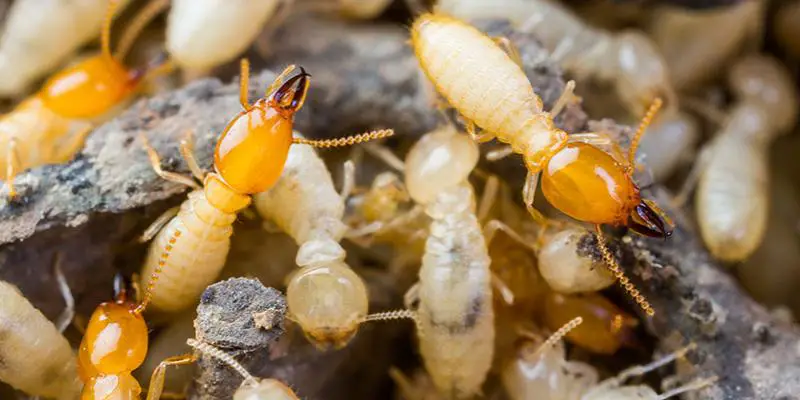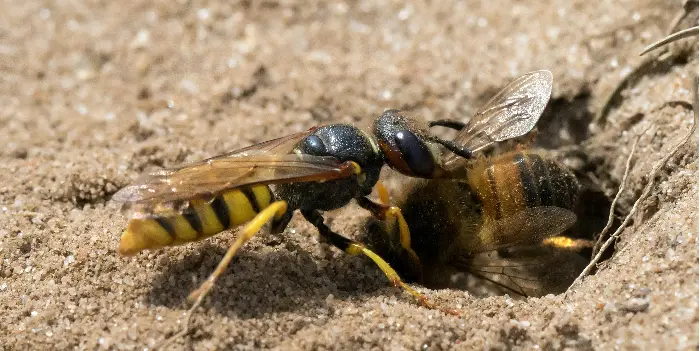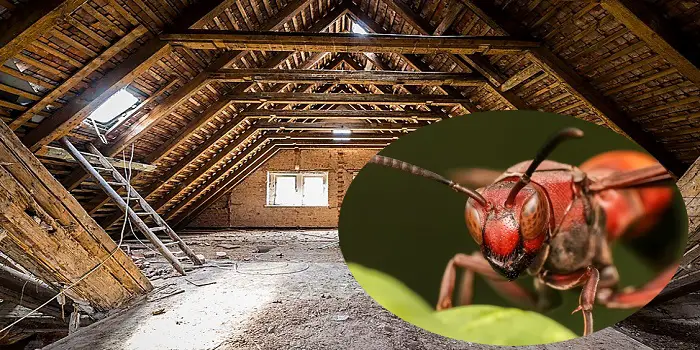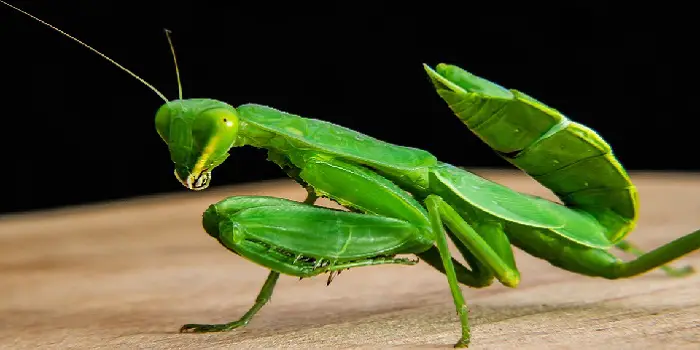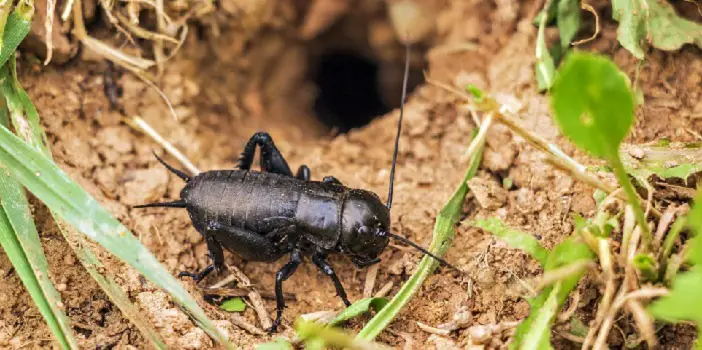
The chirping of crickets during the evenings is a welcome reminder of spring.
While the chirping can be a pleasing sound when lounging outdoors, it can be quite a different experience late at night when they are inside your home.
What was once looked forward to is now quite annoying when trying to sleep.
Unlike cockroaches, crickets are less dangerous in terms of the germs, bacteria, or diseases they might be spreading in the home.
This is because they mostly live on grass and are found in rural and suburban areas.
However, they still present a danger to the home if they find their way inside.
Below in this article, I will be discussing what crickets are, how damaging they can be, and what you can do to get rid of them.
So, let’s jump in!
What are Crickets?
Crickets are insects that belong to the Gryllidae family (also known as true crickets).
With flattened bodies and long antennae, these are related to grasshoppers and katydids.
In general, there are about 900 species of crickets found, among which four types of crickets are most common to invade your house.
These include:
- House crickets: These like to hide in warmer places (like the kitchen) and have a yellowish body
- Camel crickets: These like to crawl in moist and dark places and have a brownish color body
- Field crickets: Like to live in the light and have a dark blackish color body
- Mole crickets: Like to live underground (in lawns) and can be tough to deal with
Why Do Crickets Make That Noise?
The Chirp-chirp sound of cricket is common for most of us.
When they make noise, it’s generally the male cricket that’s seducing the females with their chirp songs.
A male cricket produces this sound by rubbing its upper wings together, which causes friction and loud noise.
It’s astonishing to know that crickets chirp at different rates. The sound pitch is mostly affected by the temperature and the time of day (night or day).
Also, you will find them getting silent once they are approached by anyone.
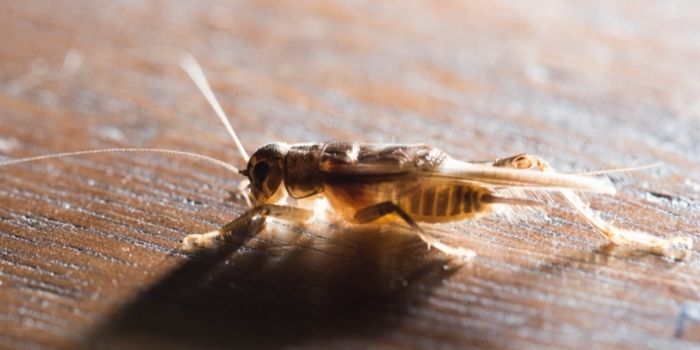
What Attracts Crickets Inside?
If you are looking for a long-term solution to get a cricket-free house, it’s essential to understand what are the things that attract them in the first place.
Here are a few things that can attract these pesky critters inside your home:
1- Garbage bin:
Crickets come attracted to waste in search of food. Cover all the bins in your garden or kitchen with a lid.
Also, ensure you dispose of the trash daily to keep your house clean and germ-free.
2- Moist places inside:
Moist places like your bathroom, kitchen, basement, garden soil, etc., are a breeding ground for crickets.
If you have high moisture in these areas, it’s recommended to use a dehumidifier.
Also, check for any cracks in your window screens, doors, walls, corners, and foundation.
Seal everything properly using caulk to prevent the water from seeping in and keep insects from entering inside.
3- Furniture and clothes:
Warm clothes and furniture (generally the upholstered ones) are warm and also attract the crickets most.
A male cricket may hide here to attract the female for mating. And a female may find these places suitable for laying their eggs.
If you find to hear the sound of cricket at these places, check these locations.
4- Long grass and thick bushes:
Crickets will generally hide and lay eggs around long bushes and grasses in your garden.
It’s good to trim your garden regularly and stop them from nesting.
Will Crickets Cause Any Damage?
Beyond the chirping the crickets will make, they will eat fabrics that include linen, cotton, silk, and wool.
This also includes items made from the aforementioned materials, which include rugs and wall coverings, and they can even damage the wood itself.
Basically, if something is made from fabric or plant material, it is in danger of being consumed by crickets.
This is why you must get rid of the crickets as soon as possible, given how fast they can multiply.
Plus, the diseases they can spread – through their feces and their voracious appetite when it comes to certain materials.
Not to mention the noise they can make means that removing them from your home should be a priority.
What follows are seven proven tips to get naturally rid of crickets.
11 Tips to Get Rid of Crickets Naturally
Crickets usually nest around moist and dark areas. One easy way to reach them is to follow their annoying chirp.
Once you have identified and located them in their hideouts, the next step is to try some natural ways by which you can either trap, kill or deter them forever.
Below are the best preventative measures you can take…
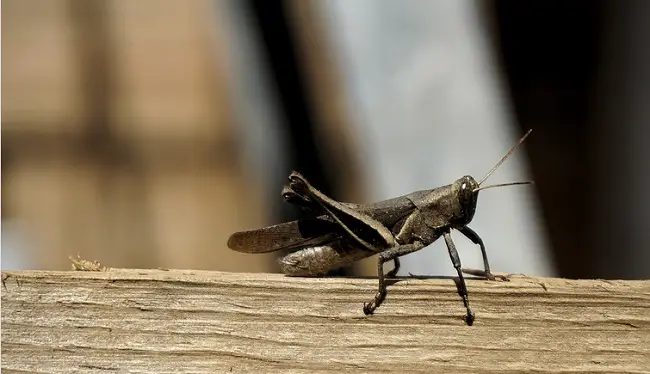
1- Cricket Glue Traps
In houses where pets or toddlers are around, using natural ways like a sticky trap is the safest option to remove crickets.
You can keep them around the corners of the wall in your home as these are where they mostly find the harborage.
You will find JT Eaton Pest Catchers Glue Trap to be one of the most effective in trapping crickets and other insects fast.
I have been using it for years without any problem.
The thing I like most about it is its heady scent that helps trap and kill insects very fast.
Worry not. It does not use any poison or baits. It’s easy to use and safe for humans.
2- Nitrogen fixing plants
Nitrogen-fixing plants (like garlic, sweet peas, and clover) irritate the crickets, and growing such plants is a cool idea.
Nitrogen is an important gas for plants. But the plants cannot take them directly from the air.
These are specifically the plants that draw the nitrogen from the air to store it in the soil and roots.
This nitrogen is then provided to the plants (including other nearby plants) in your garden to grow better.
Besides nitrogen-fixing plants, a few weeds like alliums and wormwood also help in preventing crickets and other insects.
3- Soap water
Water mixed with soap (or detergent) works as a natural pesticide for these little buggers.
The chemical ingredients present in the soap will act as a poison for crickets and can kill them instantly.
You can fill a spray bottle with soapy water and keep the mixture ready to spray on the crickets as soon as you see them around your bedroom, living room, bathroom, kitchen, or attic.
4- Homemade sprays
Just like soap water, various other sprays can be prepared to deter the deadly crickets by making use of household kitchen products.
These products may include pepper, chili, hot spices, sauces, etc.
Take some water in a spray bottle and mix any of these hot spices well.
Leave the mixture for a night.
The next day, strain away all the spices and add some dishwashing detergent and water to the liquid.
You can prepare these homemade sprays for spraying on the crickets directly or on the plants in your yard where they are found nesting.
Sprays using musk cologne, lemon juice, peppermint oil, or pine-sol cleaner can also be used as these carry the smells that deter crickets.
5- Diatomaceous earth
The powder made of silicon-rich algae skeletons is yet another non-toxic (entirely safe for pets) homemade remedy that can be safely used to get rid of crickets.
This powder, when sprinkled around your home or garden, causes dehydration in crickets, leaving them dead very soon.
You can buy it from any food store and use it to spray the indoor or outdoor areas where you see the crickets and other house insects most.
Just make sure that you do not sprinkle it on the wet area as the presence of water can affect its efficiency.
6- Dim the Lights
Most crickets are drawn to your home because of the bright lights that beckon them in the middle of the night.
Turn off those lights if you can.
If that is not possible or practical, then switch your outdoor lighting from white to amber or yellow lights.
Colors like yellow and amber do not attract bugs in the same numbers as traditional white lights.
7- Orange Guard
This is a natural product that is created from plant extract.
Available easily in a variety of different online stores, this is one of the best biodegradable pest control products you can use.
It is EPA-approved, has safe ingredients to use around the home, and is quite effective in getting rid of crickets.
8- Sticky Paper
This simple, effective means of catching crickets is similar to how sticky paper catches flies.
You simply dispose of the paper once it has done its job.
You can also put a little molasses on a plate and set it out for the crickets to consume. They will get stuck as well.
9 – Boric Acid
This natural product is another quite effective home remedy in getting rid of crickets.
Boric acid is safe to use, although when consumed in considerable quantities, it may present a danger to kids and pets.
So, if you have either around the home, you may want to use another product.
However, boric acid is one of the best if you try to completely eliminate cricket nests.
10- Pet Cats
Cats love crickets. They love to catch and eat them.
While a typical cat may not eat that many crickets, their presence is enough to dissuade many crickets from entering your home.
Given that crickets reproduce at a slower rate compared to cockroaches, a single cat may keep many potential cricket invaders from getting inside your home.
Of course, now you have a cat to feed and care for, but at least they do not chirp like crickets do when you are trying to sleep.
11- Vacuuming
This is a relatively simple way of catching crickets that have made it inside your home.
If you can spot the cricket, use your vacuum extension to suck them into the bag.
In most cases, the cricket will not survive the experience.
But in case they do, you can either empty the bag well away from your home.
Or you can simply leave them in the bag. At some point, they will starve to death.
While doing this, it should be noted that frogs and toads love to eat crickets as well.
Plus, you do not have to feed and shelter them like you do cats.
The noise they make in the middle of the night might be worse than the cricket.
So, you may be trading one problem for a bigger one if you are trying to get some sleep.
In many cultures, it’s also associated as a symbol of success coming soon in life.
Back in 500 B.C people also loved the song of cricket and had kept them in cages to enjoy their chirping song.
It’s for all these reasons, crickets when present in the home, are considered to be lucky, and killing them is a sign of bad luck.
How Can You Stop Crickets from Chirping at Night?
As mentioned before, crickets usually make a chirping sound to attract mates.
They will generally do so when they find a good warm place to hide safely.
If the sound of the cricket is what makes you annoyed and keep awake at night, you can try various ways to stop them from chirping and to make them silent.
Here are a few of them:
1- Use LED bulbs:
Many species of crickets will start chirping according to the lighting conditions in the room.
For this reason, you will generally hear them making loud sounds in the dark nights.
Lightening the LED bulb at night (where you suspect the cricket is nesting) is a great way to make them silent.
This may cost you only a few pennies for a night and can help you sleep restfully.
2- Remove food and moisture:
Along with food, crickets need warm temperatures and moisture to survive.
Temperature between 82 to 86 degrees Fahrenheit is ideal for them to chirp.
By lowering the temperature inside (switching on the ac) and removing all the water sources, you can make them move to other places where they will find suitable conditions.
3- Crickets chirping in the aquarium:
Many fish lovers keep crickets to feed the fish in the aquarium.
While it’s good for fish, their annoying sound at night can distract you from sleeping.
To stop the crickets from chirping inside the aquarium at night, you can keep your aquarium illuminated and uncovered at night.
You can cover it during the daytime and allow the insects to chirp as it won’t affect your sleep during this time.
Few other options
Just in case you find nothing to be working, you can try covering your ears (using earplugs), or use white sound machines for better sleep at night.
If there is a large group of crickets invading your house, you can use an insecticide like Raid.
Pesticides for killing crickets (like in the garage or a swimming pool) will work great but will not be safe for inside use, especially if you have children and pets.
Finally, you can even soundproof your bedroom using soundproof curtains or room dividers that will keep the annoying sound out.
This will, however, work if the cricket is chirping outside your bedroom.
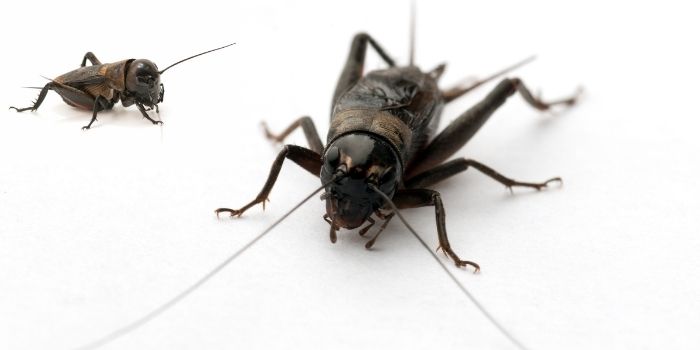
Other Related Questions:
Do crickets bite humans?
Depending on the species, cricket bites can be hurting, painful and uncomfortable.
House crickets along with black field crickets, crazy red crickets, and Jamaican field crickets are known to have the strongest jaws but their bites are not so powerful to puncture the skin.
It can also cause skin rashes, soreness, and flu-like symptoms.
Can a cricket jump on a bed?
Species like Camel crickets usually don’t chirp.
Instead, they can jump on the bed and can crawl on you when you are sleeping in your bedroom.
This can be very irritating as they wake you up in the middle of the night.
How to find a cricket in the house?
If you want to find/catch a cricket in your house, you will need to approach them slowly and quietly.
Each time you will move forward in the direction of their sound, they will stop chirping.
You will need to remain still and patient at this point.
When they feel safe and start calling again, follow again in the direction of the sound.
Eventually, you will find them hiding with a bit of patience.
The Conclusion
Crickets are vocal insects that are not always harmful or dangerous.
Even though they can cause damage to garden flowers and vegetable crops, they are known to offer various benefits as they can eat away many small pesky insects.
However, when they get inside your home, their sound can be a real nuisance.
This is where all the above home remedies can prove to be helpful.
Make sure you try them first and only kill the crickets when it’s essential.
Share the post "11 Proven Ways to Get Rid of Crickets from Inside the House?"

Welcome to ProShieldPest.com. I am Tina Jones. I have been working as a pest removal professional in Winslow, Arizona lately. At present, I love to spend my time with my family as a retiree.
Here I share all my knowledge and experiences to help people understand better how they can stop pests at their homes without actually killing them. Hopefully, the information you will find here will help in safeguarding your home! You can check more about me here.

